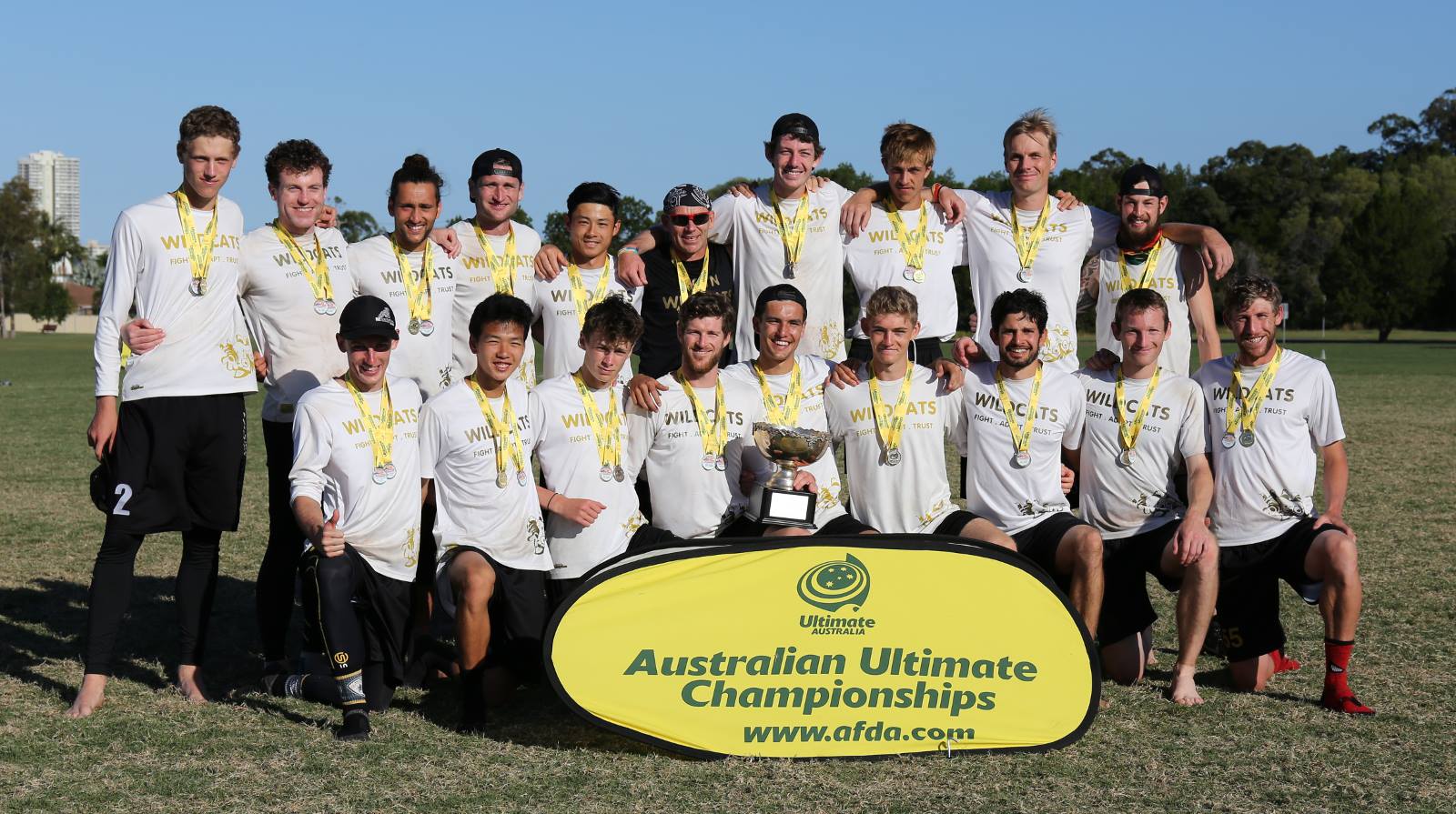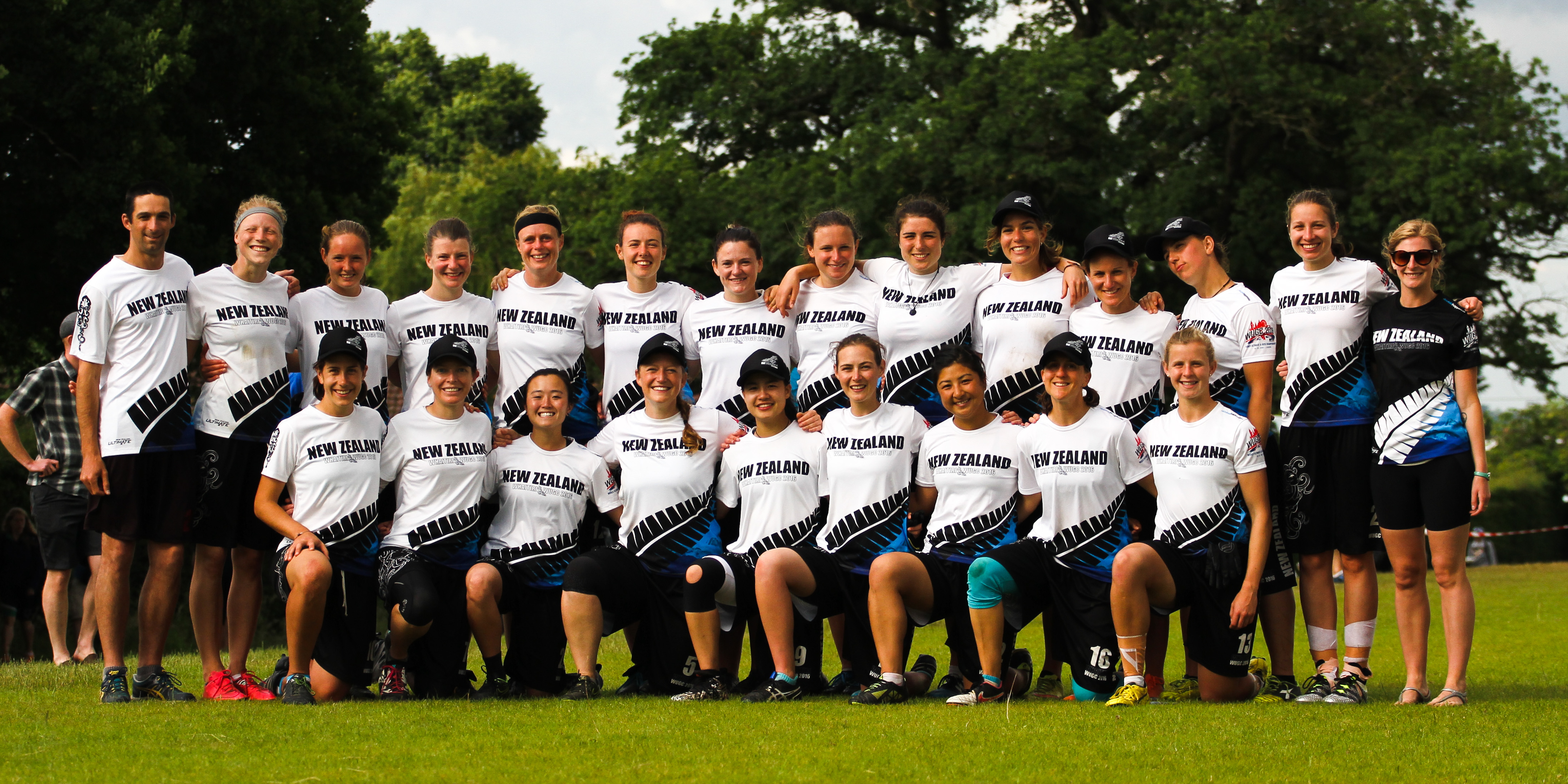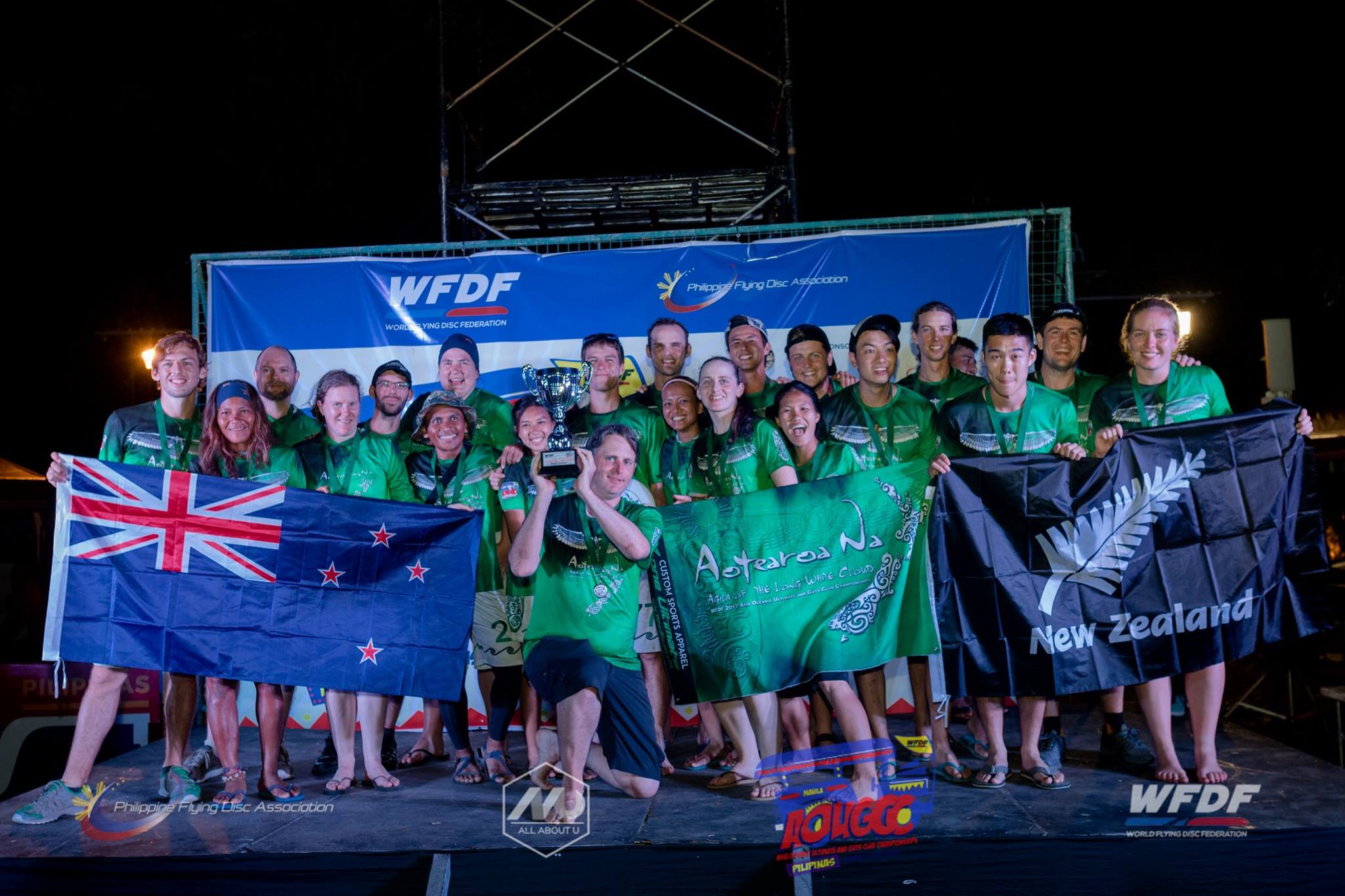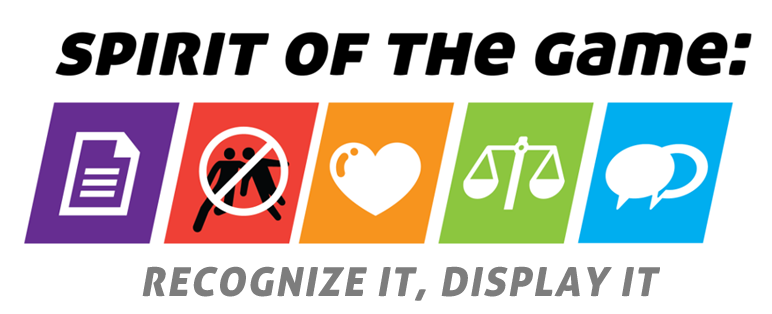 New Zealand at WCBU 2017. (Photo by Rhys Hearne)
New Zealand at WCBU 2017. (Photo by Rhys Hearne)
For a relatively small country, New Zealand has had an impressive showing in the Spirit of the Game awards at international tournaments in recent years. Winning the award in an outstanding three out of five ultimate divisions at the World Ultimate and Guts Championships in London last year (plus with the women’s team, Whaitiri, taking a close second place in Spirit scores in their division), the Kiwis then took away the Award in both divisions this year at the Australian Ultimate Championships.They followed it up with more spirit medals at the World Championships of Beach Ultimate in both the Mixed and Men’s divisions, and a mixed club team named Aotearoa nabbed the award at hand siAsia Oceanic Ultimate and Guts Club Championships. Clearly, these people have hit upon some special formula for earning the respect of any opponent.

Wellington Wildcats took away both the Spirit award and second place at the Australian Ultimate Championships 2017 (Photo by Ultimate Australia)
On Sunday, December 3rd, WFDF and E.R.I.C. are encouraging players worldwide to celebrate International Spirit of the Game Day. I had a thought: what better chance to interview these folks and share with the world some of their secrets? With the help of the WFDF Spirit of the Game sub-committee, we posed some questions and I’m really grateful to these wonderful spirit captains for taking the time to send us some responses, and to Iain Stewart, Executive Officer of New Zealand Ultimate, for putting us in touch. We heard from:
- Kelly Carter: WCBU 2017 NZ Mixed (Spirit Award)
- Angus Hines: Wellington Wildcats (Australian Ultimate Championships 2017 Men’s Division Spirit Award and Silver Medal)
- Natalie Sisson: WUGC 2016 NZ Women’s Masters (Spirit Award)
- Audrey Siple: WUGC 2016 NZ Women (2nd highest average spirit score)
- Amy Thornton: Aotearoa (AOUGCC 2017 Mixed Division Spirit Award)
- James Frascatore: WUGC 2016 NZ Men’s Masters (Spirit Award)

Please give us a quick introduction to your team and your role on the team, and maybe the highlight of that team’s campaign.
Kelly C: Team: NZL Mixed (Manuka) at WCBU17. I was Spirit Captain. Highlights include winning spirit, traveling all the way around the world to meet like-minded players and friends from all over the world, and playing high level ultimate in challenging conditions. We were training in 5 degree winter weather in June, and then competing in 45 degrees!
Angus H: I played on the Wellington Wildcats for both New Zealand and Australian Nationals. In Australia, we came second overall in the open division, while also winning the spirit prize. It showed that we were able to maintain the integrity of the Spirit of the Game while playing at the highest level we were capable of.
Natalie S: I’m the Spirit captain for Kotare (NZ Womens Masters at WUGC 2016), and our aim was to play our best, be a top 5 team and the most spirited team. We tied for spirit winners with Germany which was fantastic.
Audrey S: I was the spirit captain for the women’s team, Whaitiri, at the 2016 World Championships. While it’s hard to pick just one highlight, it would probably have to be starting off the tournament by playing Japan (the defending champs) in a showcase game.
Amy T: We are Aotearoa, a club providing opportunities for players who may otherwise not get the opportunity to play internationally and to represent New Zealand (Aotearoa). I am the Spirit Captain. We have competed at the last three Asia-Oceania championships in Singapore, Hong Kong and the Philippines. We started with a small contingent of Kiwis supported by locals, growing the club each competition to have more players making the long trek from NZ while maintaining a connection to where we are playing. We have been fortunate to win the Spirit award at all three competitions. Next stop, WMUCC 2018!
James F: I was the Spirit Captain for Tuatara, NZ’s Men’s Masters team for the 2016 WUGC. We’re pretty much what you would expect from a bunch of old players – lots of different personalities and approaches to the game that we needed to gradually change into one team. It was an absolute blast.

Natalie Sisson and her team, Kotare, celebrate with their SOTG medals at WUGC 2016 (Photo by Amy Thornton)
Can you pin down one particular area of SOTG, or one particular team attribute that led to your success?
Kelly C: Personal and team accountability for maintaining high spirit, playing within the rules, discussing calls calmly and reasonably and trusting teammates to always make the right decision. At the end of each game, we made sure that all players were involved in the spirit scoring process, to give a better overall picture of how the game went, while it is still fresh.
Angus H: Communication and hand signals is something we did very well. Not only did it mean we communicated well, with the opposition directly involved in a discussion, but we also communicated well with the rest of the team and the sideline, and it came across well in the streamed games because the commentators were more clued up about what was going on out on the field.
Natalie S: On the field we were really fair and kept our heads held high. Our team was just a fantastic group of women who all got on well, so there were no attitudes or egos and that showed in our play. We also respected every team and appreciated them. I think that showed.
Audrey S: Probably in our fair-mindedness. We were always willing to listen to the other team and sometimes gave someone the benefit of the doubt even if there was uncertainty prior to discussion.
Amy T: We’ve been using this scoring system in NZ for years, so we all have an understanding of the categories and play within them, which I think definitely helps; I am already noticing a shift in general behaviour and actions since it has been introduced at Asia-Oceania competitions. The Kiwi culture plays a part too – we’re generally friendly folk who will introduce ourselves and applaud the opposition.
James F: I honestly think age can be a really helpful attribute – makes you a bit more patient. In general we focused on acting as opposed to reacting – if our team had an issue with Spirit (internally or externally) we made sure to approach it in a nonconfrontational way.

Audrey Siple and the NZ Women’s team Whaitiri at WUGC 2016 (Photo by Carlos Federkeil)
How did you manage conversations with other teams, especially if something wasn’t going so well with SOTG?
Kelly C: I made it a priority to introduce myself to the spirit captain of the opposition, and check in with them during the game. We discussed if there had been any issues in previous games and possible resolutions.
Angus H: I think the key thing in this regard is keeping your communication clear. Even if you disagree, both being able to say your side of the story is key to it. What not to do (which happens way too much): When someone on the other team makes a call you aren’t happy with, a big flamboyant reaction (“WHAT?!” “No way!” “Aww come onnnn…” etc). I see it all the time, and it means the conversation about the call is defensive and divisive from the word go.
Amy T: At the most recent AOUGCC in Manila, the Spirit Committee set great expectations about captains meeting and chatting before each game and suggested that teams have individual chats before coming together for a big Spirit circle. This worked really well; we knew who the opposition captains were so we could approach them about anything during the game and we checked in with each other at half time. I also encourage my team to speak directly to players they have an issue with, such as contact they’re not comfortable with. If they still have issues after a chat, then I’ll go to the other Spirit captain. And if something is continuing and is concerning or frustrating your team, don’t be afraid to use a Spirit timeout. Call it sooner rather than later – pausing to reset and all get on the same page is much easier when people aren’t so frustrated and reactive. I was also surprised by how well having a team chat before the combined Spirit circle worked. It meant we could get the perspective of all players, not just mine, and offer both congratulations and advice to the other team when we did chat.
Is there a difference in Spirit of the Game in competitive ultimate, or do you think it’s the same at all levels throughout the sport?
Angus H: I think it is different at a high level. Big generalisations here, but at a social level spirit it is more about allowing everyone to play, making sure everyone knows the rules, and that the game is played as it should be. At a competitive level you have to assume everyone knows the rules and can play the game, so spirit becomes more about how you approach contact and bids, making sure that neither side attempts to gain an advantage by using (or abusing) the rules, and making sure the game stays level and fair even in intense competition (which is unlikely to be reached in most lower levels).
Amy T: No. I don’t believe there is a difference in Spirit, but I do think there can be a difference in expectations, both of behaviour and of ‘acceptable contact’. Communication is key. As long as you make your expectations known clearly and early, both teams can work to that. Don’t be afraid to stop the game and talk about it if things are going downhill. We all want to have a good time and play good ultimate. Sometimes we need to reassess to get on the same page about what that means to each team.
James F: There shouldn’t be a difference, but there is. How can any level of Ultimate have good Spirit if it isn’t modeled by the best of the best? This is something that the Ultimate community worldwide needs to think about. I think we can get tunnel vision about wanting our sport taken seriously, so we put more focus on intensity rather than Spirit. Spirit is what makes our sport unique, and if we don’t consciously teach it at all levels we risk creating a culture where Ultimate is the same as all other field sports.
How much do you think reputation matters when it comes to assigning Spirit scores?
Audrey S: Not necessarily in assigning spirit scores, but I think a bad reputation can mean other teams might come in already on the defensive which could lead to a less spirited game on both sides. Before we played one team that had really low scores our coach made sure to remind us about Spirit and give us a pep talk on maintaining our Spirit regardless. It ended up being a positive game all around and we gave the other team high Spirit scores.
Amy T: I think it matters because we are human; we all have bias, whether we’re conscious of it or not. I try really hard to be an objective voice when leading a team through Spirit scoring. If someone says ‘I was fouled a lot by X person’, I ask my teammate if they said anything about it – if they didn’t, is it fair to judge the other person when you haven’t given them a chance to change, or was it really they should know and do better? And it’s up to the team to decide the answer.
James F: I think it does, but I’m not sure that it is unfair. If you play for a team that has had low Spirit scores for years, you’re going to have to earn your way out of your bad reputation. Ultimate is a fairly forgiving sport, but if you have a bad rep you probably need to think about why and fix the problem. I’ve never been on a team that gave a bad score to a team who showed good Spirit, regardless of their rep.

Amy Thornton and her team, Aotearoa, celebrate their SOTG award at Asia-Oceanic Ultimate and Guts Club Championships 2017. (Photo by Jonathan Aumonier-Ward)
Do you think it’s more difficult or easier to do well in Spirit when you’re on a winning streak?
Angus H: It shouldn’t be, as teams should approach spirit and making calls in such a way that it is independent of the state of the game. In reality, teams probably do get a bit frustrated if they’ve been suffering more losses than they want. However often team that finish near the bottom of the table do well in spirit, I think because some teams might think ‘They were still playing hard/well/fair even when we were beating them” to justify a higher spirit score.
Natalie S: Not if you’re respectful and playing to your best level. I’ve seen plenty of highly competitive teams win the tournament and the spirit prize. They’ve risen above any issues and handled it with grace.
James F: It’s easy to be happy when you’re winning. If you’re winning, be humble and kind. If you’re losing, manage your emotions. It’s different sides of the same coin. Both are important.
Did your team (or you personally) think about Spirit other than during your games, and if so, in what ways?
Kelly C: Yes. We discussed Spirit at training camps, including rules clarification, attitude when discussing calls, and player expectations. We were also aware that team selectors took Spirit into account when selecting athletes for our teams.
Natalie S: Yes, it was always a topic of conversation the night before our games or right before our games to focus on playing our best and being spirited, on the sidelines and on the field, to our opposition and to our own teammates.
Audrey S: As part of our training camps in the lead-up to worlds we talked through rules and had some discussions around potential scenarios and what we would call/how we would explain the call. We also practiced intentionally breaking the rules so that we could practice making calls. I think when people know what call to make and how to explain the call, they’re far more likely to stay calm and not let it later affect their spirit.
We thought we’d throw in a classic clickbait question too: What’s that one simple trick that other teams will love when it comes to Spirit?
Angus H: Smile, take a breath before you say anything and use the hand signals (that’s 3 for the price of 1).
Audrey S: We did a portion of all of our spirit talks after the game in the language our opposition spoke (I think we pulled off some Japanese, French, Spanish, Swedish, and German).
Amy T: Use hand signals. As well as being eminently useful for players downfield, the sideline and for commentators. Using them really can help keep the game moving quickly. Can I have a second one? Read the rules. Have a copy in your bag or on your phone, and if you’re unsure of something look it up. Then share with any relevant players, your team and the opposition if you need to clarify.
James F: Gotta love the clickbait. The rules exist to help everyone play fairly and have fun, and they don’t pick sides. Good Spirit comes from teams that use good knowledge of the rules to always support a fair game, not to engineer a winning game.









Comments Policy: At Skyd, we value all legitimate contributions to the discussion of ultimate. However, please ensure your input is respectful. Hateful, slanderous, or disrespectful comments will be deleted. For grammatical, factual, and typographic errors, instead of leaving a comment, please e-mail our editors directly at editors [at] skydmagazine.com.